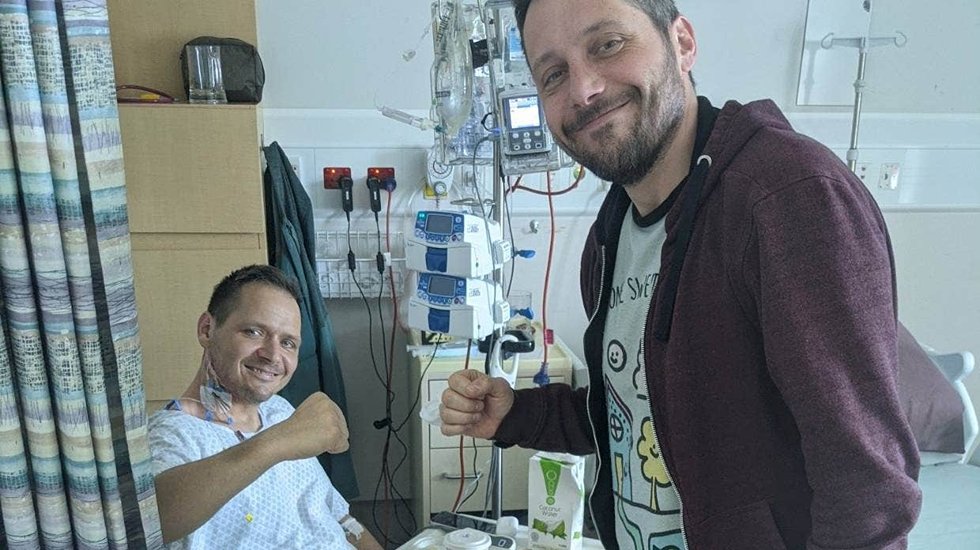Posted December 5, 2022
Brothers Gabor and Zoltan Flamis have been best friends their whole lives. Now in their 30s and 40s they're closer than ever, after a life-changing gift.
On September 22, 2021, when Gabor – a father to a 3-year-old – had barely any kidney function left, Zoltan donated a kidney to him, in one of 85 live kidney donations in Aotearoa last year.
More than a year on, the brothers now advocate for live organ donation, and want to raise awareness that those who choose to donate can both save a life, and live a full life of their own.
Fifteen years ago, then 21, Gabor was diagnosed with IgA nephropathy, an autoimmune disease that causes inflammation of the kidneys, affecting their ability to filter waste, excess water and electrolytes from the blood.
The disease varies person-to-person: some go into remission, while others develop end-stage kidney failure.
Gabor, an IT engineer, didn’t have major symptoms for years, and largely lived a “normal life”.
Then in mid-2020, just months after son Dominik was born, Gabor was given the “devastating” news his kidneys would likely fail within two years.
In February 2021, in a bid to avoid dialysis, the Wellington man sought to fast-track the transplant process.
The average waiting time for a deceased donor kidney transplant in Aotearoa is 3-4 years. This can be reduced if a patient receives a live donor transplant.
Gabor’s wife Judit, and brother Zoltan both put their hand up to see if they could donate. But things deteriorated faster than expected.
By early June – just months into the matching process – Gabor was rushed to hospital with extremely high blood pressure. His eyesight was fading, and he was being kept up at night by vomiting and migraines: his kidneys were struggling.
Gabor underwent surgery to implant a catheter into his abdomen to allow for peritoneal dialysis, a process which filters out fluid and waste otherwise regulated by the kidneys.
By then, Gabor says his kidney function was about 4% – “barely enough” to sustain him.
In August, after a lengthy process and nervous wait, Gabor learned his brother was a match – bringing them all to tears.
Zoltan, then 41, was out of hospital three days after the operation, and is “thriving”. He was back in the gym within two months, and cycling again in three, 36-year-old Gabor said.
Gabor was home within a week of surgery.
A year on, his test results are almost in line with what a person with two kidneys would show, he says. As for his brother, Zoltan is “as active today as he was before donating”.
This weekend, the pair are doing the 2-to-3-day Remutaka cycle trail to (belatedly) mark the first anniversary of the transplant.
Five years apart in age, the Flamises have always been close – Zoltan followed Gabor to New Zealand from their native Hungary – and the donation has only “strengthened” their relationship.
“It’s an amazing bond,” Gabor said.
Organ donation, for many, is a “matter of luck”, Gabor said: “People die because they don’t receive a [transplant] in time”.
He wanted people to be aware of how long the donor-matching process can take, and start this “as soon as they can”.
Organ donation is a “rare occurrence” – only 1-2% of deaths in Aotearoa occur in a situation where donation might be possible, Organ Donation New Zealand says.
In 2021, 66 New Zealanders donated organs following death – enabling 191 recipients to receive kidney, liver, lung, heart or pancreas transplants. Many more people received tissue transplants (cornea, sclera, heart valves and skin) from these donors.
The most recent Australia and New Zealand Dialysis and Transplant Registry data shows there are 448 active patients on the deceased kidney donor waiting list (as of December 31, 2021).
In 2021, 102 individual kidneys from deceased donors and 85 from live donors were transplanted – 187 in total.
Meanwhile, more than 5400 people were being treated for kidney failure over the past year, the data shows.
Traci Stanbury, Kidney Health New Zealand general manager, said the live kidney donation process can take up to a year.
Once a potential donor has been identified they undergo a stringent screening process, involving a range of both physical and psychological testing to ensure they are as healthy as possible.
Stanbury said people can face up to a five-year wait without a living donor, and the average life expectancy of someone on dialysis is not dissimilar.
Aside from surgery, live donation “doesn’t impact [a donor’s] life too much... yet the impact on the person who needs [the kidney] is quite phenomenal”, she said: “It’s absolutely life-changing”.
While it was “really important” people talk about their wishes to donate organs and tissue at the end of their lives, “with such a long waiting list, we really do need to support that with live donations as well”, Stanbury said.
Compared to deceased-donor transplants, recipients of living-donor kidneys tend to have better outcomes; the kidney will be of better quality, and therefore more likely to reduce the risk of transplant failure. They also tend to last longer, and the recipient’s recovery time is often shorter.
Gabor said though he has been on a “very challenging” journey, there was “a lot” to be grateful for.
“My brother’s selfless act of kindness and love gives me and my family a new lease on life,” he said.
Gabor said his condition brought his family closer together. It made them all rethink about “what is really important in life”, and many around them “pay a lot more attention to their health and prevention”.
“It’s the biggest gift I’ve been given, and I am going to treat it as such.”
